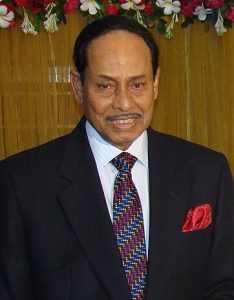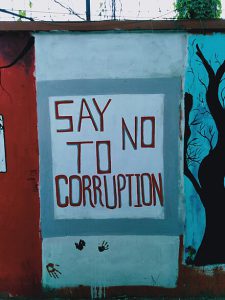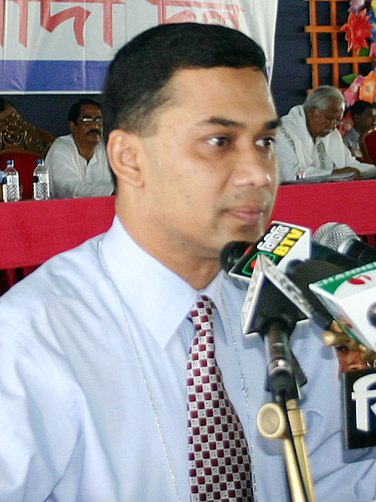Corruption in Bangladesh has been a continuing problem. According to all major ranking institutions, Bangladesh routinely finds itself among the most corrupt countries in the world.

As of 2001, corruption in the public sector was “endemic, chronic and all pervasive”.[1] In Transparency International’s 2023 Corruption Perceptions Index, which scored 180 countries on a scale from 0 (“highly corrupt”) to 100 (“very clean”), Bangladesh scored 24. When ranked by score, Bangladesh ranked 149th among the 180 countries in the Index, where the country ranked first is perceived to have the most honest public sector.[2] For comparison with worldwide scores, the best score was 90 (ranked 1), the average score was 43, and the worst score was 11 (ranked 180).[3] For comparison with regional scores, the highest score among the countries of the Asia Pacific region[Note 1] was 85, the average score was 45 and the lowest score was 17.[4] Introducing the 2020 Corruption Perceptions Index, Executive Director Iftekharuzzaman of Transparency International Bangladesh commented, “Of the eight South Asian countries, Bangladesh remains second lowest both in score and rank — better than only Afghanistan.”[5]
The Anti Corruption Commission was formed in 2004, but is considered to be largely ineffective in investigating and preventing corruption because of governmental control over it.[6][7] The Anti Corruption Commission chairman has admitted that corruption is rampant in Bangladesh.[8]
Like many other developing and emerging countries, corruption is a part of life in Bangladesh. Regular citizens routinely pay bribes for basic services and to skip queues, and officials rely on bribes to make a living.[9]
Politicians
Bangladesh Awami League
On 9 April 2012, Railway Minister Suranjit Sengupta’s assistant personal secretary, general manager of the eastern region, and commandant of security were driving to Suranjit’s residence with 7.4 million taka of bribe money, when the driver Azam Khan turned them in.[13][14]
In 2012, World Bank alleged that Syed Abul Hossain was one of the corruption conspirators in the Padma Bridge Scandal.[15] He resigned from his office on 23 July 2012.[16] Former state minister for foreign affairs and MP of Awami League Abul Hasan Chowdhury was also involved in that corruption plot. Another person involved in this case was Mujibur Rahman Chowdhury. He is the nephew of Sheikh Hasina, a member of parliament, and also a civil contractor. SNC-Lavalin admitted to bribing him in order to obtain contracts[17][18] Soon after the case emanated, Sheikh Hasina disavowed her nephew and campaigned for his opponent during the 2014 Bangladeshi general election.[19]
On 29 August 2012, Anti Corruption Commission of Bangladesh said that they have the information that Syed Modasser Ali, adviser to the prime minister Sheikh Hasina, allegedly influenced Sonali Bank authorities into granting scam loan to the controversial Hallmark Group.[20]
On 24 April 2013, a commercial building named Rana Plaza in Savar, Dhaka, Bangladesh collapsed due to structural failure. That building was owned by Sohel Rana, a Jubo League (youth wing of Bangladesh Awami League) leader.
On 27 April 2014, the incident named Narayanganj Seven murder occurred. The main plotter of that incident, Nur Hossain, was the vice-president of Siddhirganj Awami League.[21]
On 15 October 2015, Awami League MP Manjurul Islam Liton was arrested for shooting a 9-year-old boy named Shahadat Hossain Shoura.[22]
On 10 April 2016, Bangladesh Supreme Court Appellate Division upheld 13-year jail to former minister of Disaster Management and Relief Mofazzal Hossain Chowdhury Maya rejecting his review plea seeking acquittal in graft case.[23][24][25][26][27][28]
In November 2016, Awami League MP Abdur Rahman Bodi was sentenced to three years of prison and fined US$1 million for illegally amassing and hiding wealth of US$100 million.[29][30]
On 13 July 2017, Gazi Tarique Salman, a civil servant (UNO) was harassed by police, local administration,[31] and local Awami League leader Obaidullah Saju.[32]
Even though Swiss National Bank (SNB)’s data published on 29 June 2017 shows that Bangladesh has BDT 4423,00,00,00,000 in Swiss banks which is an increase by 20% since 2013–14,[33] [34] Bangladesh’s minister of finance Abul Mal Abdul Muhit said that “Media exaggerated rise of Bangladeshi deposit in Swiss banks”[35] [36]
Bangladesh’s anti-corruption commissioner filed cases against former Prime Minister Sheikh Hasina and 49 ex-ministers for siphoning more than $150 billion to various countries, including India, Hong Kong, Switzerland, Luxembourg, Singapore, Malaysia, UAE, Australia, UK, USA, and New Zealand.[37][38] Former Prime Minister Sheikh Hasina, her son Sajeeb Wazed and niece Tulip Siddiq accused of embezzling more than $5 billion from Rooppur nuclear power plant project that costs Bangladeshi tax payers $12.65 billion.[39][40]
Bangladesh Court imposed travel restrictions on 26 former Awami League ministers under significant corruption investigations.[41] Al Jazeera’s Investigation Exposed Bangladesh’s Minister Saifuzzaman Chowdhury’s exclusive property portfolio in Dubai, London, New York, San Francisco, and New Jersey. According to undercover video recordings of the Al Jazeera investigation unit, Former Prime Minister Sheikh Hasina knew all along about Mr Chowdhury’s corruption.[42][43]
Bangladesh Nationalist Party
In 2007, Military backed caretaker government charged Harris Chowdhury, former Political Secretary of Prime Minister Khaleda Zia, of acquiring his wealth through corruption. Chowdhury was charged with involvement in the Murder of former finance minister, Shah AMS Kibria, in 2005.[44] He was also charged with involvement in 15 August 2004 Dhaka grenade attack and Zia Charitable Trust corruption case.[45] On 21 December 2014, an arrest warrant was issued against him.[46] His properties were confiscated by the directives of Bangladesh High Court.[47] Harris Chowdhury is a fugitive from 2007.[48]
On 22 July 2007, Wadud Bhuiyan received 20-years’ of prison sentence for illegally amassing more than a million dollar of cash and property.[49]
Tarique Rahman believed to be involved in digital money laundering with Bangladesh Bank
On 16 October 2008, it has been reported that the Interpol found the trace of a deposit of BD taka 141.5 million with a bank in Hong Kong of former foreign minister M Morshed Khan. Both he and his son Faisal Morshed Khan have been convicted in several cases relating to corruption, hiding wealth information, land grabbing and criminal activities after the caretaker government came to power in January 2007. Both of them are fugitive from 2007.[50] On 5 June 2016, High Court ordered freezing of Morshed Khan, his wife and son’s Hong Kong bank accounts.[51]
On 3 November 2008, a leaked US Embassy cable said that the Embassy in Dhaka believed Tarique Rahman was “guilty of egregious political corruption that has had a serious adverse effect on US national interests”.[52]
On 24 June 2011, Niko Resources, a Calgary-based oil and gas company, has pleaded guilty to bribing Bangladeshi minister AKM Mosharraf Hossain with a luxury SUV and a trip to New York and Calgary, and will pay a $9.5-million fine.[53][54][55]

The Anti-Corruption Commission filed the case with Gulshan Police Station on 16 August 2011 against Hafiz and his wife for laundering US$1.75 million to Singapore.[56] On 23 August 2015 Bangladesh Supreme Court scrapped his acquittal from High Court.[57]
On 4 July 2014, Bangladesh Supreme Court sentenced former minister of civil aviation Mir Mohammad Nasiruddin and his son Mir Helal Uddin to thirteen years’ of prison in two separate corruption cases.[58]
On 15 November 2014, Prof AKM Shafiul Islam Lilon of Department of Social Science of Rajshahi University was hacked to death by Jubo Dal (youth wing of Bangladesh Nationalist Party) leader Anwar Hossain Ujjal.[59]
Jatiya Party (Ershad)
Hussain Muhammad Ershad convicted in Janata Tower Case
Known in Bangladesh as “Sugar Zafar”, Kazi Zafar Ahmed, because of his alleged role in the hijacking of a multimillion-dollar aid shipment of sugar, he was sentenced to 15 years’ jail in absentia on corruption charges by a Dhaka court in November 1999.[60][61][62]
On 20 November 2000, Hussain Muhammad Ershad was convicted and sentenced for Janata Tower Case. As a result, he was declared ineligible to contest the general election of 2001. Ershad is also the main accused of the murder case of Major General Muhammad Abul Manzoor[63][64][65].
On 10 November 2002, the dead body of a prominent model named Syeda Tania Mahbub Tinni was found under the Buriganga Bridge which was later found to be perpetrated by former student cadre and MP of Jatiyo Party, Golam Faruk Ovi.[66] Golam Faruk Ovi is a fugitive and believed to be hiding in Canada.[67]
Student politics
Main article: Student politics of Bangladesh
In public universities and colleges the student wings of ruling[68] political parties dominate the campuses and residential halls through crime and violence to gain various unauthorised facilities.[69] They control the residential halls to manage seats in favour of their party members and loyal pupils. They eat and buy for free from restaurants and shops inside their campus.[70] They extort and grab tenders[71] to earn illicit money. They take money from job seekers and put pressure on university administrations to appoint them.[72] In government colleges they take money from freshmen candidates and put pressure on teachers and officials to get acceptance for them.[73][74][75] Some of them have been involved in robbery[76] and extortion.[77]
Government
A graffiti against corruption drawn by the students after the July Revolution
Corruption abounds in Bangladeshi government offices. Many officials receive salaries without having any actual assigned work. Officials are recruited and promoted for reasons that are not objectively clear. Solicitation of bribes is common. In a 2013 survey, 76% of respondents said corruption was a problem in the public sector, and 39% said they had paid a bribe during the previous 12 months. Bribes were especially common when dealing with the police (72%), the judiciary (63%), land services (44%), and registry and permit services (33%). Bribes were paid to obtain a service (58%), to speed up service (33%), to express thanks (7%), or to obtain cheaper services (3%). These numbers, though unimpressive, mark a significant improvement over 2010.[10]
In 2010, then president Zillur Rahman pardoned twenty convicted murderers of Shabbir Ahmed Gamma. In July 2011, he again pardoned Awami League leader and convicted murderer Biplob.[78][79]
Prime examples of government corruption are 2011 Bangladesh share market scam.[80][81][82][83][84]
Padma Bridge Scandal, occurred in 2011, was the largest political scandal in Bangladesh that involved the ruling Bangladesh Awami League’s government who allegedly sought a large amount money from the Canadian construction company SNC-Lavalin in exchange for awarding them the construction contract.[85][86]
On 10 December 2012, some hackers hacked and posted the seventeen hours’ of Skype call of chief justice Nizamul Huq on YouTube where he suggested that he was under pressure from the government to reach a quick verdict in the ongoing 1971 war crime cases against the country’s senior opposition leaders.[87]


